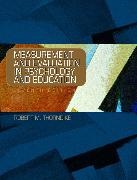Read more
List of contents
PART ONE: TECHNICAL ISSUES
1. Fundamental Issues in Measurement.
2. Measurement and Numbers.
3. Giving Meaning to Scores.
4. Qualities Desired in Any Measurement Procedure: Reliability.
5. Qualities Desired in Any Measurement Procedure: Validity.
6. Practical Issues Relating to Testing.
PART TWO: TESTING AND MEASUREMENT DEVICES
7. Assessment and Educational Decisions.
8. Aptitude Tests.
9. Standardized Achievement Tests.
10. Performance and Product Evaluation.
11. Interests, Personality, and Adjustment.
12. Aptitudes and Rating Scales.
PART THREE: SPECIAL TOPICS IN TESTING
13. Assessment of Children with Disabilities.
14. Ethics and Issues in Assessment.
15. Principles of Test Development.
APPENDIX: Percent of Cases Falling Below Selected Values on the Normal Curve
References.
Author Index.
Subject Index.
Summary
For undergraduate and graduate level introductory courses in psychological and educational measurement.
In this new edition of one of the best-known texts in the field, Thorndike once again provides all of the information future professionals need to know in order to develop the skills to use test information wisely, incorporating standard measurement concepts as they apply to both educational and psychological assessments his classic introduction to educational and psychological measurement provides a technically rigorous treatment of the core issues in measurement in an easy-to-read, easy-to-understand presentation. In preparing students to become independent users of test information, it describes problems in measurement, explains how these problems are approached and solved, surveys a broad range of sources, and provides guidance in how to find, evaluate, and use information about specific tests. The text's focus on basic issues in measurement provides a general overview that is not too specialized.

